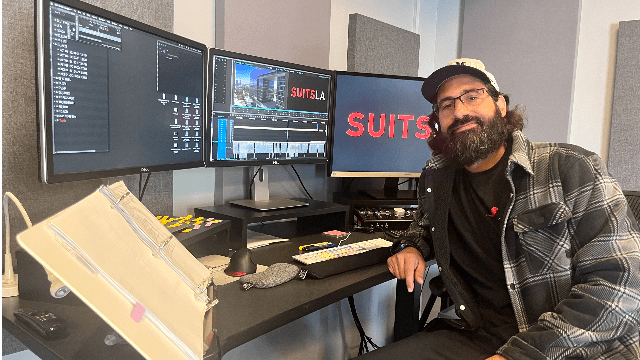Q&A with Suits and Grey’s Anatomy Editor, NYFA Alum Dan Rovetto
NYFA Alumni Network: Can you tell us a bit about yourself, where you're from, and what brought you to New York Film Academy?
Dan Rovetto (D.R.): Sure, I’m a scripted Hollywood editor and proud member of American Cinema Editors. I grew up in Dumont, NJ which is about 20 miles northwest of New York City. In my final semester at Rutgers University I secured an internship at MTV in Times Square where I was setting up new hires in the Production & Development department. This was during the days of Jackass and The Hills and once I graduated in 2003 I continued working at MTV in my administrative capacity. All the while, however, I was plotting my move to the creative side of things :). Once I decided that editing was the path for me I knew I wanted to learn the craft at New York Film Academy. Thankfully MTV was very supportive.
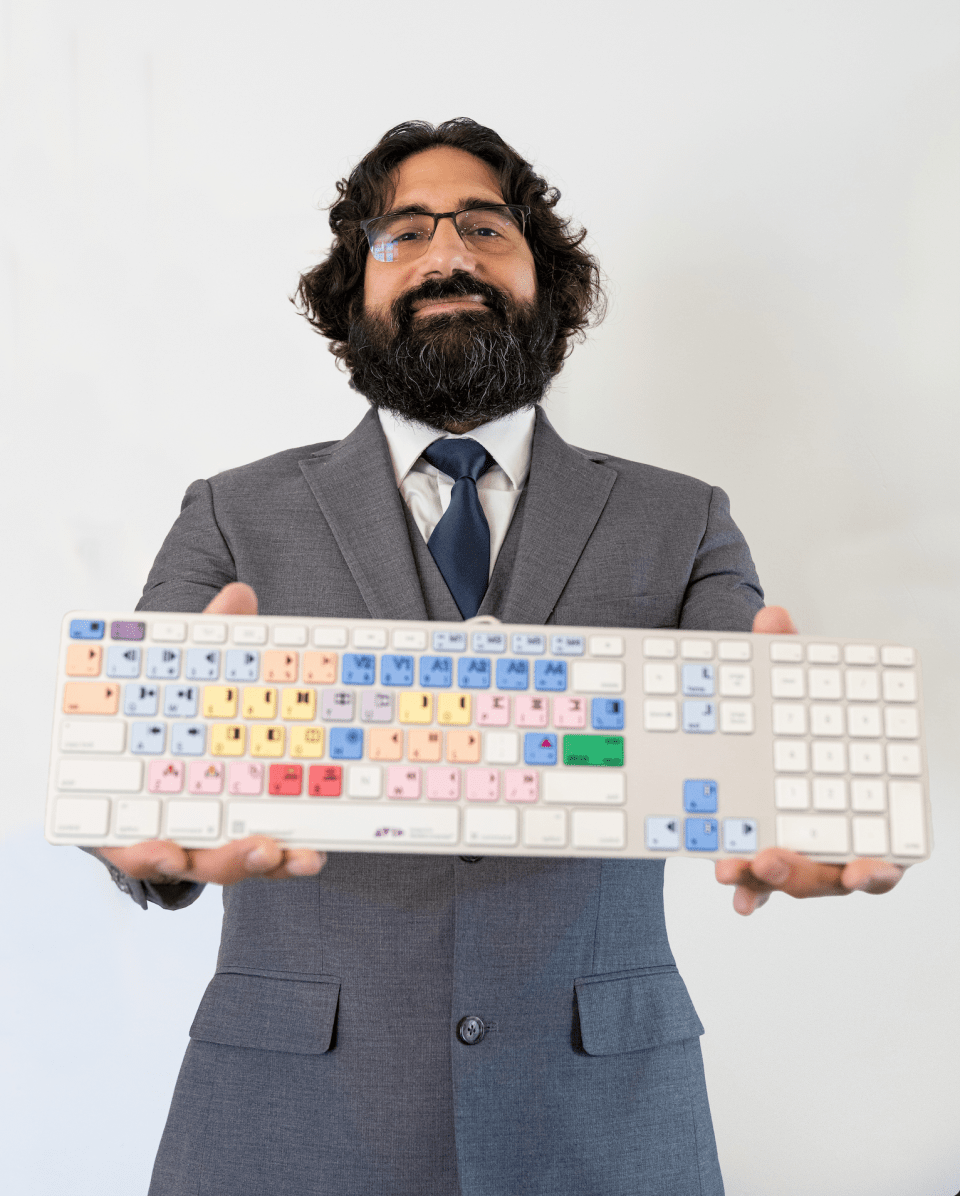
NYFA Alumni Network: What drew you to editing in the first place?
D.R: Family movie nights were really big in my house and I remember falling in love with storytelling at a young age after watching films like Star Wars and Indiana Jones. My father was also really into audio/visual technology and bought one of the earliest consumer video cameras so my brothers and I would always grab that bad boy and get into trouble filming pranks and music videos; editing within the camera and between VCRs.
My first introduction to editing with software was during my teenage years making skateboard videos with friends; however I never considered it a possible career path at the time. It wasn’t until I got to MTV and saw that our department would hire editors to cut presentations for projects being considered for pilots that I thought we should have a dedicated in-house person doing that. And then the next thought was that the person should be me…naturally. haha.
NYFA Alumni Network: Tell us about your career. What are some of the projects you're most proud of?
D.R: As I mentioned, my career in entertainment started out at MTV. Once I decided I wanted to be an editor and started taking classes at NYFA I was eager to use what I was learning in my classes and see how I could apply it to my current administrative role. Since I was responsible for hiring and managing the interns for the Production & Development department, as well as managing camera gear, I decided a good project for everyone could be to create a humorous intern orientation video. Giving those involved some production experience while creating something useful for the department.
In addition to being a lot of fun running around the city and taking over the TRL studio, the video turned out great and was one of the first projects I was able to show my department which highlighted my early editing skills. From there I cleaned up an abandoned broadcast room and turned it into a makeshift edit bay where I officially started cutting projects for the department. I’m happy to say that by the time I left MTV I was editing full time for the department with state of the art gear and a proper edit suite.
After working my way up to editing in reality television, I discovered that while I had a genuine love for the craft, my true passion lay in the scripted shows and films I grew up watching with my parents. The combination of carefully-crafted narratives and the visual artistry of performance truly ignited my creativity. So, before I advanced too much further in the world of reality TV, I made a commitment to do whatever it took to break into scripted.
While still on the east coast I connected with the woman who was running the American Cinema Editors intern program out in Los Angeles and when I realized that I earned her support I knew that if I moved to LA I would have a real shot at breaking into Hollywood. Lori Jane Coleman, ACE became my first mentor and was instrumental in the early stages of my career. Once I convinced my pregnant wife to uproot our two boys and move 2700 miles away from anyone we knew, Lori invited me into her Covert Affairs cutting room and encouraged me to shadow her assistant editor.
Early on in Santa Monica, I returned to assistant editing in reality…at night. Knowing what my goals were made this seemingly backwards step in my career worth it, and working at night turned out to be a blessing in disguise since it freed up my days for networking. During one of my shadowing sessions, Lori introduced me to Peter Forslund, ACE—the editor who would give me my big break, bring me onto Suits and became one of my greatest advocates and closest friends.
During my time assistant editing on Suits, I did whatever I could to be the best AE possible while supporting both my editor and the post department. Once I felt like I had my AE duties on lock, I would focus on taking any opportunity to make a name for myself as an editor. Whether that was cutting scenes, episode recaps, gag reels or webisodes. And in not too long I had the opportunity to cut my first episode during the back half of Season 3. Season 4, I cut one more, and then Season 5, I officially started editing for the series.
From that point, I was fortunate enough to establish myself as the showcreators go-to editor. Aaron Korsh and I collaborated on some of Suits’ most pivotal episodes, season premieres and finales, Meghan Markle’s on screen wedding, the backdoor pilot for Pearson, and eventually the series finale, which took place in its ninth season.
Shortly after Suits had ended, I started editing for Grey’s Anatomy which was shot and edited at Prospect Studios in Los Feliz, CA. This was one of my first times editing on a studio lot and the excitement of passing crew members lugging camera gear or saying hi to actors on their way to set as I made my way into the edit bay was something that never got old. Unfortunately, in not too long the global pandemic of 2020 would rock the industry and force us to find creative ways to keep getting episodes to air. So I spent the next 2 seasons editing out of my garage.
As a result of people spending more time at home in the months and years following the start of the pandemic, streaming was at an all time high and Suits was
having a resurgence. In 2023 it was the most streamed series with almost 58 billion viewing minutes. So when I got the call to edit the pilot for Suits LA it wasn’t a total shock and I was thrilled to be part of the latest series in the Suits franchise.
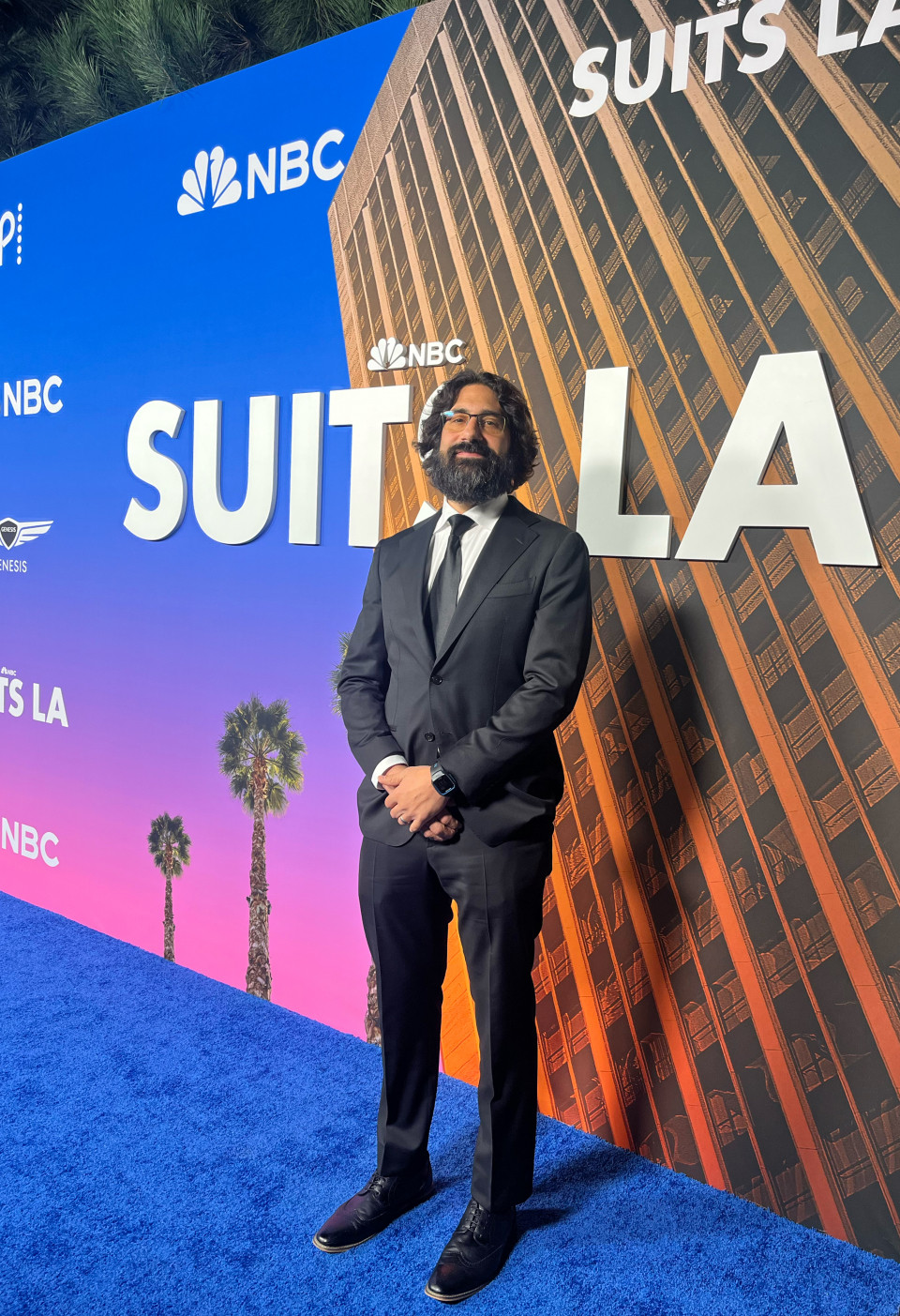
NYFA Alumni Network: Most recently you edited the pilot for Suits LA, a dynamic new chapter in the franchise. What was the biggest creative challenge you faced in establishing a fresh tone for the new series while staying true to the original Suits universe?
D.R: Editing the pilot for Suits LA has been a great privilege. The challenge of honoring the iconic storytelling style of the original series while introducing fresh elements, new characters and their arcs was exciting and rewarding. Crafting performances for characters being introduced for the first time is particularly important. With no prior reference for these characters, every decision shapes how the audience perceives them.
Take Ted Black, our lead. We were particularly careful in how we handled his moments of anger, doing our best to make sure they always felt earned and justified. A key example is the flashback scene with his father outside the hospital. When I originally cut this scene, I was tempted to use more intense takes from Ted as he confronts his father. Having read the script, I knew the totality of what his father had done and therefore it could justify a much more heated performance. From an audience member’s perspective however, when we get to that scene, we only know that Ted’s father has wronged him, but we don’t yet know to what degree. By toning down Ted’s performances, we hoped to preserve his character's favorability and complexity of his arc.
Another pivotal moment with Ted’s character, and the overall feel of the pilot, presented itself in the opening scene. The pilot starts off with a flashback where Ted, working as a NYC federal prosecutor at the time, goes to pressure an informant, Billy, into testifying in a case. As it was originally scripted and edited, Ted walks up to the door and immediately sucker punches Billy. After Ted threatens Billy’s daughter if he doesn’t testify, a brawl breaks out between the two of them.
As you could imagine, there are likely some people who expected to be starting off with glamorous shots of Los Angeles and getting right into a sexy new Suits LA law firm. Aaron and I agreed, however, that this wasn’t the typical Suits world, and felt it was important to establish that distinction right away. Also, reordering or lifting the scene wasn’t an option due to its importance in the pilot’s structure. As a compromise, however, we worked on recutting the scene without the initial sucker punch, adding ADR lines to better justify Ted’s behavior, and adjusting the overall tone to strike the right balance. The pilot did get greenlit with this version of the scene, but we ultimately wound-up reshooting it once production started on the series in order to further refine it - removing all the physical violence and rewriting dialogue to deepen Ted’s motivations.
As an editor I really enjoy this nuanced process of shaping individual performances and overall story. Sometimes it’s about replacing entire takes. Other times it’s as subtle as swapping in a single word’s inflection while keeping the picture the same. At times, you may have to reorder scenes to perfect pacing and the emotional resonance of storylines. And on rare occasions, a reshoot may be necessary in the attempt to have a story hit just right. The totality of these decisions, both big and small, carry immense weight.
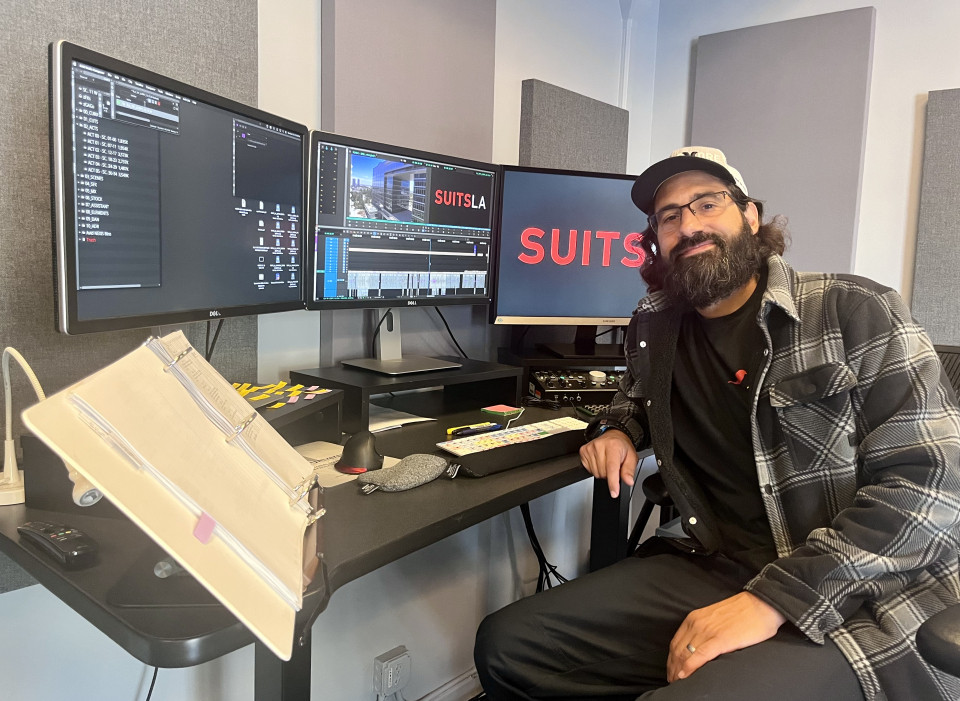
NYFA Alumni Network: How closely do you work with the directors during the editing process?
D.R: On scripted series editors typically spend 4-6 days collaborating with directors during their Director’s Cut days. Working closely with directors as you finesse performances, story and the visuals of the episode is one my favorite parts of the process. Although we don’t have as much time with directors as you would on features, the time spent together is very special and an integral part of each episode. Personally I like to connect with my directors as early into their prep as possible. Whether that's tracking them down on set to say hi or sending a quick message, I like to make myself available for any questions they may have throughout prep and shooting. It’s common for directors to have story point questions or ask how the footage is cutting together and if any additional coverage is needed.
NYFA Alumni Network: Do you have any advice for someone considering a career in editing?
D.R: For anyone considering a career in editing, I would say grab your iphone, shoot some footage and start playing around in Premiere Pro or some other user friendly editing software. You don’t necessarily need to wait until you’re inspired, the muse will come to you once you sit down to edit..the inspiration will flow while you are putting in the time. You’ll come up with creative ideas, realize you don’t know how to accomplish them and then research how to execute your vision. For me this was a natural way to learn whatever software I was working in. Whether Final Cut Pro (yup), Avid, Premiere, After Effects or even Photoshop.
If you then feel strongly that this is the path you want to pursue I recommend you set your ultimate goal and then break it down into smaller, more immediately achievable steps. Everyone's path is different but what has worked for me was first setting my goal of becoming a scripted editor who was part of American Cinema Editors. I didn’t know what all the steps to get to that point would be but I knew what I could be doing right away to put me on the path. Sort of like walking on a trail in the woods with dense fog all around you. You can only see a few feet in front of you but it's just enough to allow you to keep moving forward. By continuing further, more of the path clears up ahead of you and every step of the way you are gaining more confidence that you can achieve what you set out to do.
Ok more specifically? Haha. It’s tempting for aspiring editors to reach out to working editors thinking that they can somehow get them their first opportunity. And although in some cases that may work I would say it's rare. Editors may be able to provide inspiration, which is valuable, but I wouldn’t expect to gain much more than that as you are starting out. What you really want to do is build your network of assistant editors and even post pa’s if possible. These are the people who are in a position to share working knowledge of the first positions in editorial that will put you one step closer to editing.
At a minimum, useful skills for an assistant editor to have are being highly organized, good with sound design, temp visual effects and having a great attitude. If you develop skills with color correction, music, advanced visual effects or any other area that would be helpful to your editor this could go a long way in setting you apart from your peers. I believe it's important to always impress people at the job you were hired to do before setting your sights on the next step. So kick ass at your assistant editor duties first and then start looking for opportunities to hone and showcase your editing skills. Whether that's cutting scenes for your editor or gag reels for the wrap party. Take every opportunity to learn and get your work in front of your team. Be patient and continue on the path. The fog will clear and opportunities will present themselves.
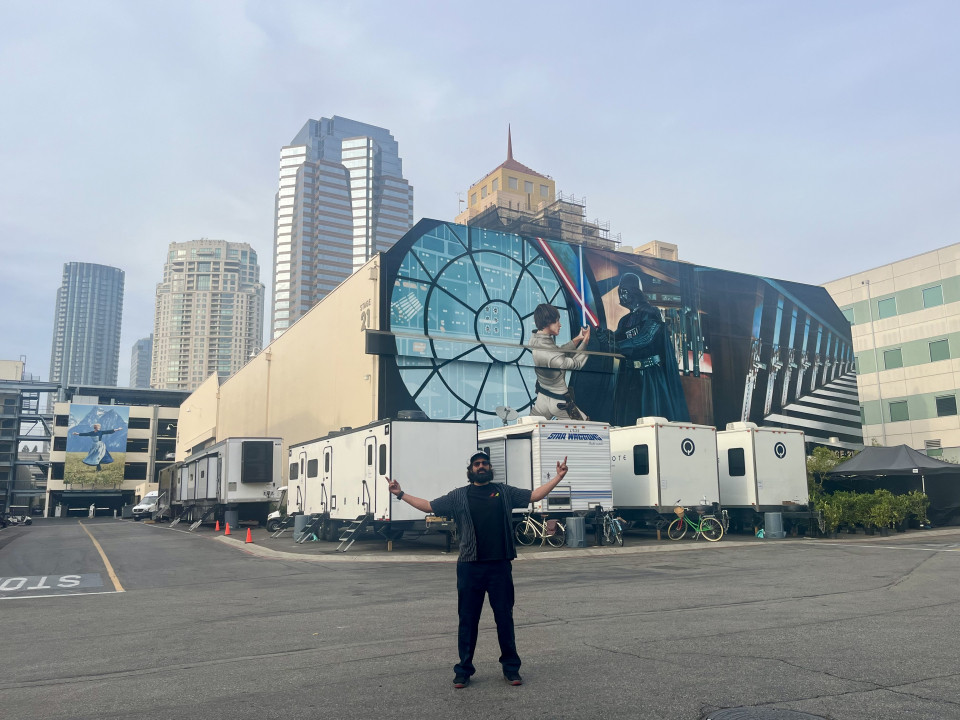
NYFA Alumni Network: Are you currently working on any future projects?
D.R: Currently I’m working on the Suits LA season 01 finale episode at Fox Studio Lot in Century City, CA. It’s been a challenging but very fulfilling season. Getting to collaborate again with showcreator Aaron Korsh, along with former and new colleagues who are like family, has been a real pleasure. Although the stress and pressure can be high at times, developing new characters and story arcs within the framework of the Suits world has been creatively very rewarding.
Yes, it was sad to learn that a season 02 pickup would not happen, especially since rumors led us to believe otherwise, but I feel grateful to have been a part of this chapter in the Suits franchise. I know Hollywood has seen better days but I am hopeful for the future of the industry and am looking forward to whatever my next projects and opportunities to grow creatively may be.

Comments0
Please log in to see or add a comment
Suggested Articles


